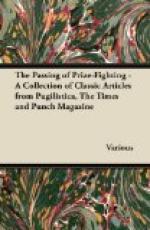The room was fairly full at the moment, and at the sound of the shot several members looked up from their newspapers. One young fellow—I fancy he was a country member recently demobilised—who had evidently watched the incident, exclaimed, “Pretty shot, Sir!” But two or three of the older men frowned irritably and said, “Sh-sh-sh!”
Seeing that it was incumbent upon me to apologise, I said, in a tone just loud enough to be audible to all present, “I beg your pardon, gentlemen.” Then I dropped the spent cartridge into an ash-tray, returned the pistol to my pocket and was just stretching out my hand to touch the bell when old Withergreen, the doyen of the club, interposed.
“Pardon me,” he said, “I am a little deaf, but almost simultaneously with the fall of this member upon the hearthrug I fancied I heard the report of a firearm. May I claim an old man’s privilege and ask if I am right in presuming a connection between the two occurrences, and, if so, whether there has been any recent relaxation of our time-honoured rule against assassination on the club premises?”
Shouting into his ear-trumpet, I said, “I fired the shot, Sir, which killed the member now lying upon the hearthrug. I did so because he addressed me in a form of salutation which I regard as peculiarly objectionable. He called me ‘Old Sport,’ an expression used by bookmakers and such.”
“Um! Old Port?” mumbled old Withergreen.
“OLD SPORT,” I shouted more loudly. Then I stepped to the writing-table, took a dictionary from among the books of reference, found the place I wanted and returned to the ear-trumpet.
“I find here,” I said, for the benefit of the room at large, for all were now listening, though with some impatience, “that in calling me a ‘sport’ the deceased member called me a plaything, a diversion. If he had called me a sportsman, which is here defined as ‘one who hunts, fishes or fowls,’ he would have been not necessarily more accurate but certainly less offensive.”
At this point there stood up a member whom I recognised as one of the committee. “I am sure, Sir,” he said, “that all present are agreed that you fired in defence of the purity of English speech, and that the incident was the outcome of an unfortunate attempt to relieve the financial embarrassment of the club by relaxing our former rigorous exclusiveness. Speaking as one of the committee, I have no doubt that the affair will be dismissed as justifiable homicide.”
Having bowed my acknowledgments I rang the bell. When the waiter appeared I bade him “Bring me a black coffee and then clear away the remains of Mr. Buttinbridge.”
* * * * *
Then I was awakened by the voice of Buttinbridge yelling, “Wake up, old Sport!”
* * * * *
[Illustration: Grocer. “NOW, MY MAN, THE BUTTER YOU BROUGHT US LAST WEEK—EVERY PACKET OF IT WEIGHED ONLY FIFTEEN OUNCES.”




